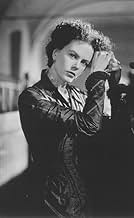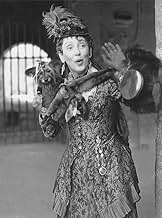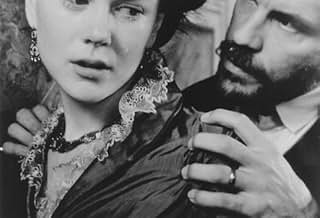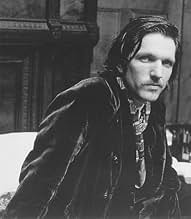AVALIAÇÃO DA IMDb
6,2/10
13 mil
SUA AVALIAÇÃO
Uma garota americana herda uma fortuna e cai em uma relação mal orientada com um cavalheiro de confiança, cuja verdadeira natureza, incluindo uma disposição afiada e gananciosa, transforma s... Ler tudoUma garota americana herda uma fortuna e cai em uma relação mal orientada com um cavalheiro de confiança, cuja verdadeira natureza, incluindo uma disposição afiada e gananciosa, transforma sua vida em um pesadelo.Uma garota americana herda uma fortuna e cai em uma relação mal orientada com um cavalheiro de confiança, cuja verdadeira natureza, incluindo uma disposição afiada e gananciosa, transforma sua vida em um pesadelo.
- Direção
- Roteiristas
- Artistas
- Indicado a 2 Oscars
- 5 vitórias e 15 indicações no total
Amy Lindsay
- Miss Molyneux #1
- (as Katie Campbell)
- Direção
- Roteiristas
- Elenco e equipe completos
- Produção, bilheteria e muito mais no IMDbPro
Avaliações em destaque
Many people could not warm up to this remarkable adaptation of Henry James' novel, A Portrait of a Lady. The dark, abusive themes and open ending are not part of typical costume drama fare, but both are true to Henry James' novel and to Jane Campion's vision.
Henry James originally wrote the novel in the 1880s. Intended as an exploration of what a woman might do if she were given independent means, James' book indicts women as being trapped by a weaker nature. Exploring the same material Campion's movie comes to a different conclusion.
The adaptation and direction are superb. The movie maintains the steady rhythm of doom that makes James' novel an enduring classic. There is no place where this is more evident in the film than in its lingering images. The camera holds on to the subject a moment longer than expected, making the viewer a little uncomfortable, and anticipating sudden disaster that never quite arrives. Ms. Campion directs this film like a horror film, which is exactly what it is.
The acting in this film is also convincing, from Nicole Kidman's paralyzed Isabel, to John Malkovich as a hypnotically terrifying pursuer. They are backed by a solid cast of major actors in minor roles, all adding to Isabel's complex societal tragedy.
Portrait of a Lady, particularly this film adaptation, is a remarkable example of how stories may stay the same, but their meanings change over time.
Related films include: Washington Square (1997), The House of Mirth (2000), The Buccaneers (1995)(mini).
Henry James originally wrote the novel in the 1880s. Intended as an exploration of what a woman might do if she were given independent means, James' book indicts women as being trapped by a weaker nature. Exploring the same material Campion's movie comes to a different conclusion.
The adaptation and direction are superb. The movie maintains the steady rhythm of doom that makes James' novel an enduring classic. There is no place where this is more evident in the film than in its lingering images. The camera holds on to the subject a moment longer than expected, making the viewer a little uncomfortable, and anticipating sudden disaster that never quite arrives. Ms. Campion directs this film like a horror film, which is exactly what it is.
The acting in this film is also convincing, from Nicole Kidman's paralyzed Isabel, to John Malkovich as a hypnotically terrifying pursuer. They are backed by a solid cast of major actors in minor roles, all adding to Isabel's complex societal tragedy.
Portrait of a Lady, particularly this film adaptation, is a remarkable example of how stories may stay the same, but their meanings change over time.
Related films include: Washington Square (1997), The House of Mirth (2000), The Buccaneers (1995)(mini).
How can Henry James' novella "Turn Of The Screw" swallow me in whole while I find his other work wordy and arrogant? And how can the same director that has made the two most boring movies I have ever seen, "Two Friends" and this one, also be the same person behind "Sweetie" and "Holy Smoke" - the two finest examples of a movie drawing real characters in real places I have ever seen? This film left me in a state of semi-paralysis.
Being a fan of slow-paced, foreign, and period piece movies, I was pretty surprised at how much this movie bored me. I'm writing this review to try to sort out my feelings of bewilderment.
I think one problem is the use of John Malkovich. We've seen him soar to great heights in the paradoxical "Being John Malkovich" and "The Glass Menagerie", but here his monotone is overly droll and predictable, almost as if he is playing off himself in a Saturday Night Live sketch. In fact the most enjoyable part of this movie was the scene where Mr. Malkovich twirls the umbrella in an ambiguously literal attempt to hypnotize Isabel. If only there were more of these elements in the film....
Then there's Nicole Kidman, whose underachieving attempts at acting has managed to ruin films by not one but two of the greats: Ms. Campion and Stanley Kubrick. Her delivery was similar to Gwyneth Paltrow's in "Mr. Ripley" -- obviously lost. She's just another pretty face thrown into a role of substance after receiving excessive amounts of hype. Watching them act gives me the same feeling I get watching the members of Milli Vanilli try to sing. In their element, they can be undeniably sexy or cute, but in deeper roles the viewer is left completely clueless to their characters' motives. Is Isabel supposed to be docile, alluring, witty, in-control, charismatic, or not-in-control? We can't tell.
In this mess, Barbara Hershey and Martin Donovan as the sickly cousin were both very good. But alongside the weak link Kidman there was little they could do. And Campion made some extremely unusual stylistic sidetracks, the very sidetracks that work in the Holy Smoke India scenes. But in a period piece the fading dream suitors, inexplicable intro, and Chaplin filters seemed inappropriate, although one has to admire her for trying. Even when I don't agree with her methods I respect her sense of adventure (but let's face it, I'll love her forever because of Sweetie). With a little more humility from Campion, a different Isabel, and a more invigorated Malkovich this film might have worked.
For a good treatment of James, try to scare up a copy of the 1961 film The Innocents.
Being a fan of slow-paced, foreign, and period piece movies, I was pretty surprised at how much this movie bored me. I'm writing this review to try to sort out my feelings of bewilderment.
I think one problem is the use of John Malkovich. We've seen him soar to great heights in the paradoxical "Being John Malkovich" and "The Glass Menagerie", but here his monotone is overly droll and predictable, almost as if he is playing off himself in a Saturday Night Live sketch. In fact the most enjoyable part of this movie was the scene where Mr. Malkovich twirls the umbrella in an ambiguously literal attempt to hypnotize Isabel. If only there were more of these elements in the film....
Then there's Nicole Kidman, whose underachieving attempts at acting has managed to ruin films by not one but two of the greats: Ms. Campion and Stanley Kubrick. Her delivery was similar to Gwyneth Paltrow's in "Mr. Ripley" -- obviously lost. She's just another pretty face thrown into a role of substance after receiving excessive amounts of hype. Watching them act gives me the same feeling I get watching the members of Milli Vanilli try to sing. In their element, they can be undeniably sexy or cute, but in deeper roles the viewer is left completely clueless to their characters' motives. Is Isabel supposed to be docile, alluring, witty, in-control, charismatic, or not-in-control? We can't tell.
In this mess, Barbara Hershey and Martin Donovan as the sickly cousin were both very good. But alongside the weak link Kidman there was little they could do. And Campion made some extremely unusual stylistic sidetracks, the very sidetracks that work in the Holy Smoke India scenes. But in a period piece the fading dream suitors, inexplicable intro, and Chaplin filters seemed inappropriate, although one has to admire her for trying. Even when I don't agree with her methods I respect her sense of adventure (but let's face it, I'll love her forever because of Sweetie). With a little more humility from Campion, a different Isabel, and a more invigorated Malkovich this film might have worked.
For a good treatment of James, try to scare up a copy of the 1961 film The Innocents.
Henry James's "The Portrait of a Lady" stands as one of the greatest psychodramas in literature, a precise and coolheaded dissection of the evolution of a privileged, idealistic if slightly arrogant young woman. This work exemplifies so many qualities which distinguish his view of human nature; he is compassionate, empathetic and observant yet unyielding in exposing the follies, bad judgement and darkness inherent is his characters. No one, especially Isabel Archer, is let off the hook for their misguided choices and her fate is tragic yet completely plausible and, as laid out by James, completely compelling.
A lost opportunity is the best way to describe the film. It is interestingly photographed, full of greys, blues and whites and suggests an almost funereal solemnity in its production design and cinematography. And Nicole Kidman makes a perfect, iridescent Isabel Archer; she looks the part in every respect and certainly conveys the character's intelligence and poignant receptivity to the sights and people around her.
Would that the film had served her better; Jane Campion and the scriptwriter, Laura Jones, eviscerate James's novel but retaining the basic story and structure but put it through the meatgrinder of 90s feminist revisionism. It has been transmogrified into a simplistic tract of victimization and domestic violence, but in doing so Campion and Jones haven't managed to at least raise the story's entertainment value or even create a coherent narrative line for the audience to follow. Rather than present Isabel as a poignant, charismatic figure who unwittingly corrupts her life through bad choices and misguided idealism, the writer and director show us a woman who is victimized by a big bad Man who keeps her locked up in the house, abuses her and steals her money upon duping her into an unhappy marriage. In doing so, James's great work has been drained of its universality and dramatic impact. And while sexual exploitation and gender roles certainly play a part in sealing Isabel's fate in 19th century society, by ignoring the trenchant thematic notions of self determination and the risks of emotional idealism presented by James in his book, we are given a shallow, one-dimensional creation lacking in James's acid edge. Campion cheats a modern audience of discovering filmically a great and still-relevant work by a writer who dared to travel down the darker alleys of a more "civilized" age.
A lost opportunity is the best way to describe the film. It is interestingly photographed, full of greys, blues and whites and suggests an almost funereal solemnity in its production design and cinematography. And Nicole Kidman makes a perfect, iridescent Isabel Archer; she looks the part in every respect and certainly conveys the character's intelligence and poignant receptivity to the sights and people around her.
Would that the film had served her better; Jane Campion and the scriptwriter, Laura Jones, eviscerate James's novel but retaining the basic story and structure but put it through the meatgrinder of 90s feminist revisionism. It has been transmogrified into a simplistic tract of victimization and domestic violence, but in doing so Campion and Jones haven't managed to at least raise the story's entertainment value or even create a coherent narrative line for the audience to follow. Rather than present Isabel as a poignant, charismatic figure who unwittingly corrupts her life through bad choices and misguided idealism, the writer and director show us a woman who is victimized by a big bad Man who keeps her locked up in the house, abuses her and steals her money upon duping her into an unhappy marriage. In doing so, James's great work has been drained of its universality and dramatic impact. And while sexual exploitation and gender roles certainly play a part in sealing Isabel's fate in 19th century society, by ignoring the trenchant thematic notions of self determination and the risks of emotional idealism presented by James in his book, we are given a shallow, one-dimensional creation lacking in James's acid edge. Campion cheats a modern audience of discovering filmically a great and still-relevant work by a writer who dared to travel down the darker alleys of a more "civilized" age.
An interesting film with an undercurrent of sexual repression similar to that in Campion's other films. Nicole Kidman is excellent, given the material, though her transition from likeable, virtuous innocent to a cold and corrupted woman doesn't ring as true as it should--the three years glossed over with a subtitle isn't adequate to show the change. I blame this on the interpretation, direction, and/or editing rather than Kidman's performance, however. Malkovich is not as strong, and one wonders what any woman could see in him as a lover.
The ending is cold and unsettling. Most filmgoers prefer to know that their hero/heroine is "safe" at the end of the story. Here, who knows ?
Production values are good, and the film is quite stylish with interesting use of camera tilt, lighting, and angles. It's quite artsy. I am glad I saw the film, but acknowledge it's not likely to be everyone's cup of tea.
The ending is cold and unsettling. Most filmgoers prefer to know that their hero/heroine is "safe" at the end of the story. Here, who knows ?
Production values are good, and the film is quite stylish with interesting use of camera tilt, lighting, and angles. It's quite artsy. I am glad I saw the film, but acknowledge it's not likely to be everyone's cup of tea.
Nominated for two oscars, but neither one was for the leads. a period piece, in 1872. Nicole Kidman is Isabel Archer, who isn't ready to marry, in spite of the proposals from well to do european gentlemen. a galaxy of co-stars - Malkovich, Barbara Hershey, Christian Bale. her friends and family are concerned, even shocked at the opportunities she's passing up. she meets up with Gilbert (Malkovich), and is intrigued by him. what she doesn't know is that he and Madam Serena (Hershey) are toying with her. some similarities to Dangerous Liaisons, also Malkovich!. this one is a little more complicated, since Gilbert's daughter Pansy is also involved. Portrait of a Lady was one of the last films of Shelley Winters. she's the disapproving old aunt, who thinks Isabel is shameful for passing up these chances. also the other Shelley.... Duvall. lot of talking and discussions. much like a jane austen or Bronte Sisters novel. it's pretty good. strategic mind games, as possible romances are considered or denied. the sound is a bit odd. frequently there is an echo from microphone placement... not sure if that was intentional or not. and many scenes are sparsely lit, so sometimes it's confusing to know who's currently talking. Isabel makes her choices, then has to live with them. life lesson there. directed by Jane Campion... won the oscar for The Piano.
Você sabia?
- CuriosidadesFirst collaboration between director Dame Jane Campion and Nicole Kidman. However, it was Campion who discovered Kidman, where she, at the age of fourteen, was performing at Australian Theater for Young People and subsequently caught the eye of Campion.
- Erros de gravação(at around 47 mins) A horse carriage is passing through the shot from right to left. The crew with dolly-cam and equipment is clearly visible.
- Citações
Ralph Touchett: I love you but without hope.
- Cenas durante ou pós-créditosJane Campion thanks her family, Colin, Alice and Richard, for their generous support, suggestions and encouragement during the making of this film.
- Trilhas sonorasImpromptu in A Flat Major, Op 90 No. 4, D899
(1828)
Composed by Franz Schubert
Adapted for screen by Brian Lock
Performed by Jean-Yves Thibaudet (as Jean Yves Thibaudet)
Courtesy of Decca Records Company Ltd.
Principais escolhas
Faça login para avaliar e ver a lista de recomendações personalizadas
- How long is The Portrait of a Lady?Fornecido pela Alexa
Detalhes
- Data de lançamento
- Países de origem
- Idiomas
- Também conhecido como
- The Portrait of a Lady
- Locações de filme
- Palazzo Pfanner, Lucca, Tuscany, Itália(Osmond's palace in Florence)
- Empresas de produção
- Consulte mais créditos da empresa na IMDbPro
Bilheteria
- Faturamento bruto nos EUA e Canadá
- US$ 3.692.836
- Fim de semana de estreia nos EUA e Canadá
- US$ 107.819
- 29 de dez. de 1996
- Faturamento bruto mundial
- US$ 3.692.836
- Tempo de duração2 horas 24 minutos
- Cor
- Mixagem de som
- Proporção
- 2.35 : 1
Contribua para esta página
Sugerir uma alteração ou adicionar conteúdo ausente

Principal brecha
By what name was Retratos de uma Mulher (1996) officially released in India in English?
Responda



































